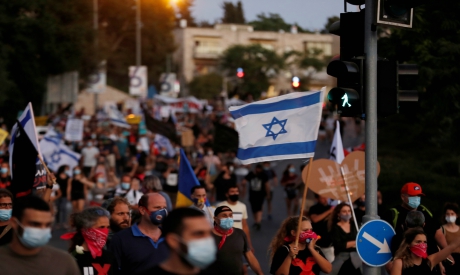
File Photo: Israelis march as they protest against Israeli Prime Minister Benjamin Netanyahu and his government's response to the financial fallout of the coronavirus disease (COVID-19) crisis in Jerusalem July 21, 2020 (Reuters)
Israeli police are on high alert Thursday, hours before major protests are scheduled to begin in Jerusalem.
The demonstrations, with voices in favor and against Prime Minister Benjamin Netanyahu, will be held in front of his residence.
In recent weeks, Netanyahu's official house has been the focal point of many protests amid seemingly growing dissatisfaction with the government.
Those opposing the government are against Netanyahu's response to the COVID-19 crisis. Drawing criticism for a lackluster program to combat the economic fallout of the pandemic, anti-Netanyahu protestors are also wary of a new law that allows the government to bypass the parliament when enforcing anti-virus measures.
The longest serving Israeli prime minister is also under criticism for running the country while on trial for corruption charges.
On Thursday evening, Netanyahu's supporters are also slated for showing up in front of the same place. Although his approval ratings have dropped in recent weeks, Netanyahu still has loyal followers.
Coupled with the growing civil unrest is political instability. The wobbly coalition government sworn in this May after over a year of political paralysis and three elections appears to be hanging on a thread.
If a budget is not approved by the end of August, the parliament will be dissolved automatically, leading to another election. Meanwhile, the coalition partners engage in daily squabbles on an array of topics, wearing down confidence in the ability of the government to survive.
Netanyahu and his partner, also rival, Defense Minister Benny Gantz would both lose a lot in another election. With the crisis in Israel widespread, the prime minister would take a huge risk at holding a referendum when the public is increasingly dissatisfied with his performance.
Gantz had sacrificed much of his political credibility when he entered the partnership with Netanyahu despite an election promise not to do so.
Members of parliament and municipal leaders have called Netanyahu and Gantz to put their differences aside and combat the major crisis Israel is facing.
"In the short term, the government will probably not fall even though the breaks are screeching," said Eran Vigoda-Gadot, a professor of political science and governance at the University of Haifa. "Once the COVID-19 crisis is over, the divisions will become even more visible."
Some Israeli media have reported that Netanyahu is set on breaking-up the coalition and heading to the ballots in November.
In the past weeks, the feeling of a looming crisis has emerged from the streets. Frequent demonstrations and scenes of Israelis clashing with police forces signal a breaking point in society.
"This is one of the most complex situations the country has ever dealt with," Vigoda-Gadot told Xinhua.
"Israelis feel that the government is not operating in a clear consistent manner with their welfare at the top of the agenda," said Jonathan Rynhold, a professor with the Political Studies Department at Bar Ilan University.
The last time Israel witnessed widespread social protests was in 2011, against the high cost of living in the country. Netanyahu consequently approved a series of reforms.
Critics of the government say its response to the fallout of the pandemic has been inadequate and slow. With an alarming unemployment rate and inconsistent decisions on how to battle the virus, the public is growing impatient.
"The protests are underestimated. The government does not understand the depth of the crisis and the wave of protests will not subside, but rather will intensify as people's despair grows," said Vigoda-Gadot.
Hours before demonstrators arrive in Jerusalem, Israeli president tweeted to the members of the coalition.
"Get your act together! Our citizens need you focused and working to find a solution to this unprecedented crisis Israel has found itself in," wrote Reuven Rivlin.
Short link: